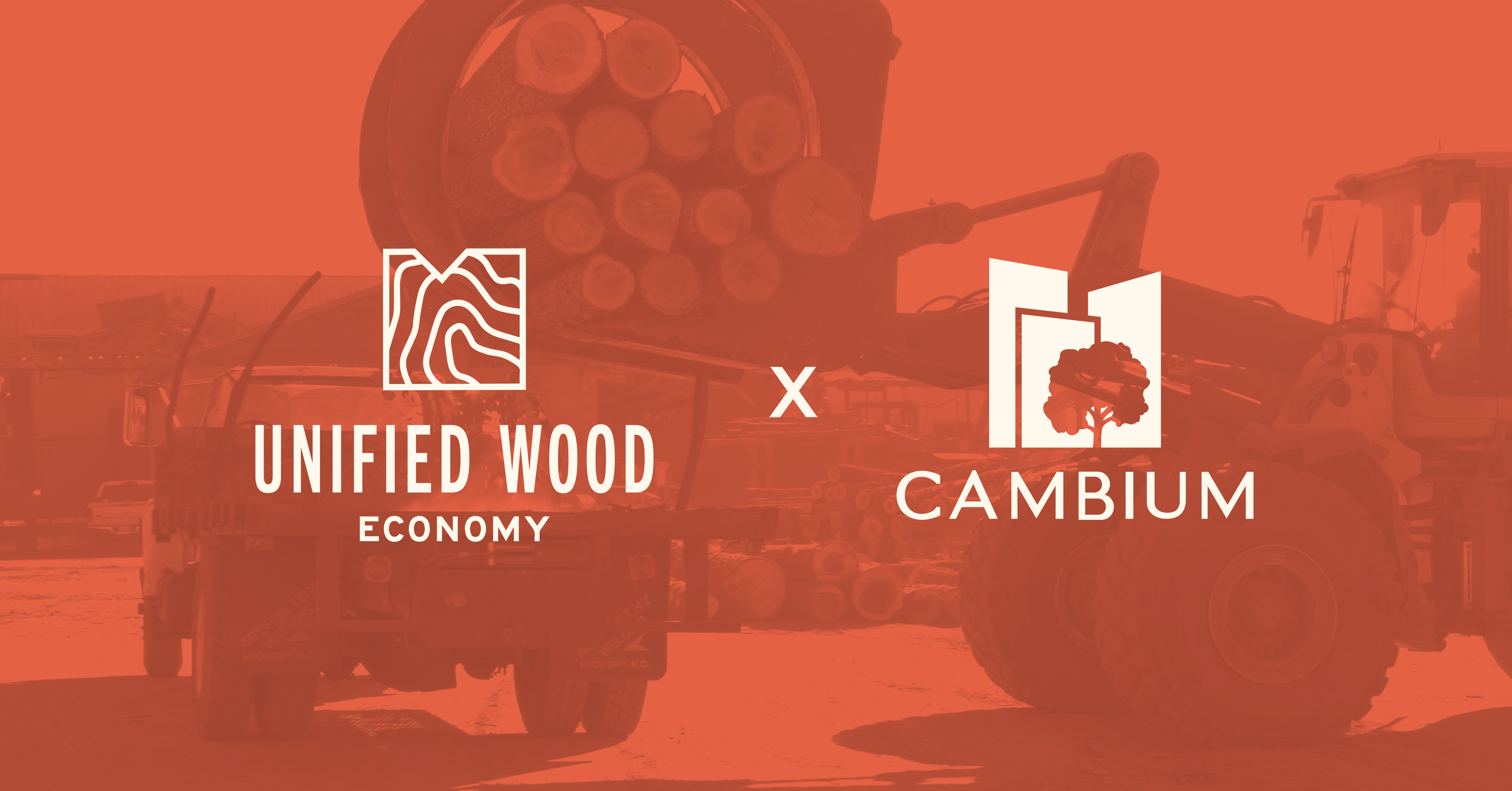Cambium and UWE partner to grow salvaged wood recovery opportunities
Cambium and UWE partner to grow salvaged wood recovery opportunities

Across the U.S., millions of tons of usable wood are discarded every year—burned, chipped, landfilled, or left to rot. Each log represents lost carbon storage, wasted resources, and a missed opportunity for local jobs.
Cambium and Unified Wood Economy (UWE) are now partnering to change that.
By bridging the full supply chain from recovery to market, Cambium and UWE will more efficiently convert historically wasted wood into measurable economic, environmental, and community impact.
UWE—a national nonprofit—develops Wood Upcycling Campuses, regional hubs that collect, sort, and process wood and woody debris that would otherwise go to waste. These sites keep material out of landfills, create local jobs, and build the infrastructure needed to scale recovery—diverting historically wasted wood into its highest and best uses (including mulch, compost, biochar, and high-value lumber).
Cambium is focused on growing the full salvaged wood supply chain. Using an AI-powered data platform, the company tracks and moves logs efficiently out of waste streams and into processing centers. These materials are transformed into high-value products—including millwork, dimensional lumber, mass timber, furniture, and other wood products—and brought into regional and national markets under Cambium’s Carbon Smart Wood™ brand. In doing so, Cambium ensures that wood that would otherwise go to waste becomes a source of economic, environmental, and community impact.
For Jeff Carroll, Co-Founder of UWE, the collaboration shows what’s possible when mission-driven organizations work together: “By combining our technical expertise and networks, we can expand the reach and effectiveness of wood reuse across the country—and show how circular systems can drive real change.”
Together, Cambium and UWE are building a regenerative wood recovery network that helps cities, landowners, and sawmills turn discarded wood into high-value products that support good jobs and long-term carbon storage. By combining their expertise, resources, and market connections, they’re creating a system that keeps wood—and value—circulating within local communities.
Why It Matters
When wood is thrown away, everyone loses. Small businesses and municipalities pay for disposal, local manufacturers miss out on affordable raw materials, and the carbon stored in trees is released back into the atmosphere, contributing to climate impacts.
By keeping salvaged wood in circulation, Cambium and UWE are creating measurable value for communities, businesses, and the planet. Together, they help to:
Reduce disposal costs for cities and landowners: Diverting usable wood from landfills and burn piles lowers municipal waste management expenses and frees up resources for other community priorities.
Create new manufacturing and processing jobs: Local mills, sawyers, and furniture makers gain consistent access to material, supporting employment and strengthening regional economies.
Store carbon longer: Turning waste into durable products such as mass timber, furniture, and millwork keeps carbon sequestered for decades.
Strengthen domestic lumber supply chains: Recovering local wood builds resilient regional markets, reduces reliance on imported timber, and ensures material is available where it’s needed.
Unlock hidden economic opportunities: Salvaged wood becomes a source of revenue for local businesses, supports entrepreneurs, and funds future circular economy initiatives.
Support community resilience: Keeping wood circulating locally ties environmental benefits to social and economic outcomes, showing how regenerative supply chains can strengthen both people and place.
By framing salvage wood as a resource, not waste, Cambium and UWE are demonstrating how collaboration, infrastructure, and market development can turn what was once discarded into a foundation for sustainable growth, climate impact, and community prosperity.
As Cambium Co-Founder & COO Marisa Repka explains, “From trees felled due to storms or disease to hurricane-damaged wood, there is tremendous potential to salvage and repurpose this material. Our partnership with UWE allows us to scale wood utilization in ways that benefit communities, businesses, and the environment.”
In 2026, Cambium and UWE will partner with select cities, regions, and funders to launch new Wood Upcycling Campuses and expand consulting services that turn wood recovery into measurable impact. By keeping wood in circulation and fostering collaboration, they are creating a practical, profitable, and regenerative model for resilient communities across the country.
_______
About Unified Wood Economy (UWE)
Unified Wood Economy (UWE) is a national nonprofit forging circular wood supply chains that transform large-scale wood waste into valuable products that upcycle wood, capture carbon, create jobs, and scale impact. UWE’s social entrepreneurial model enables its staff to work with partners on the ground to develop regenerative systems.
About Cambium
Cambium is a public benefit corporation advancing Carbon Smart Wood™ material systems through product innovation, consulting services, and transparent data infrastructure. Cambium connects underutilized wood to markets for mass timber, furniture, and other value-added products while helping communities, businesses, and municipalities unlock economic and environmental benefits.